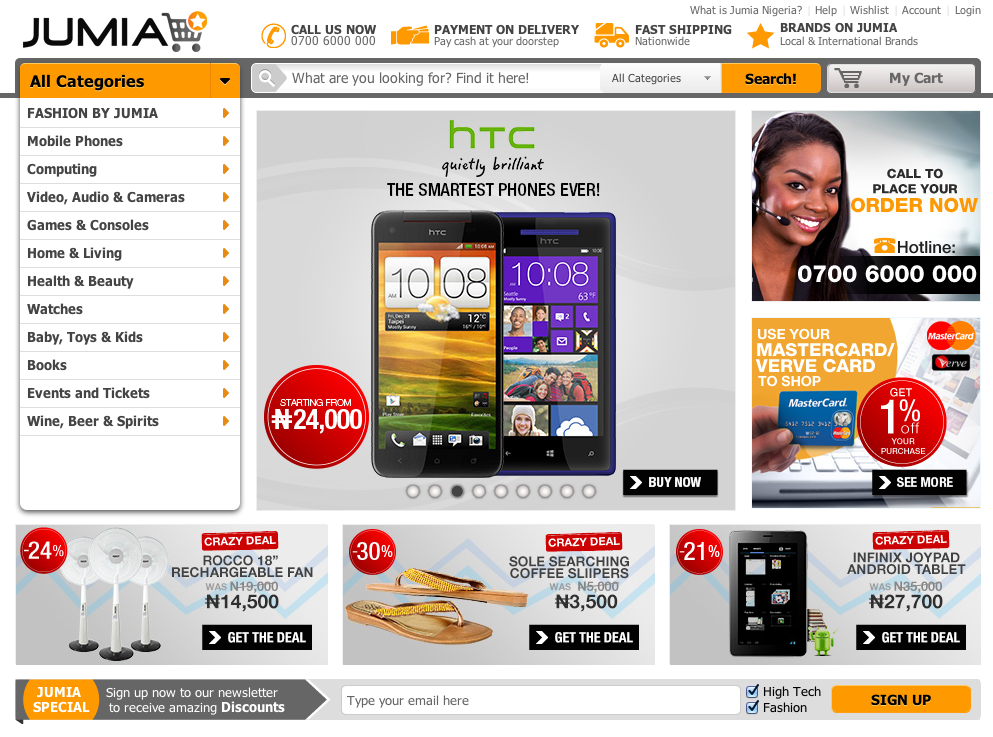General News
Making the Most of London 2012

My last assignment as a sports journalist was at the 2006 National Sports Festival (NSF) in Abeokuta and Ijebu Ode, Ogun State – the same year Germany hosted FIFA’s World Cup Finals. Six years is a pretty long time, and I was wondering how the London Games would go by without me putting a word.
But times have also changed. I moved from being a sports reporter to a technology writer, after a spell as Communications’ Consultant with one of the nation’s brightest firms in Lagos. But what do the Games of the XXX Olympiad hold in stock for humanity? Are Nigerians really in the mix for a better outing? What new technological innovations are we likely to experience with the London 2012 Games?
For starts, the London 2012 Games would be the most viewed programme on television in the history of humanity. Olympic officials estimate an incredible four billion people across the world would atleast watch one sports of the games through the 17 days of this summer.
That would double the figures of Beijing, China in 2008 where it was recorded that 1.3 billion Chinese (alone) watched the closing events. Jacques Rogge, president of the International Olympic Committee (IOC), noted then that it was the most watched event in human history.
“We had more broadcast coverage to more people, in more places than ever,” said Rogge during his closing news conference in the Chinese capital. Now, South Sudan would be added as a nation of people who watched the games this summer.
Each games come with its own peculiarity: broadcast innovations, marketing breakthroughs and entertainment values. The London 2012 Games are already awash with what it would bequeath mankind. Costs are mind-bugging as governments of host cities go all out to secure financing for the Games.
A BBC cost overview of the London 2012 Games shows why poor countries would never afford to host the Olympics. “On 15 March 2007 the government announced the budget for the Games had risen from £2.4 billion to £9.35 billion, although it said the cost of the Games would be £5.3 billion.”
So how did that work out? “New venues cost £3.1 billion – these include the Olympic Park at Stratford and the athletes’ village. £1.7 billion spent on regeneration and infrastructure. £600m spent on extra security – the government of David Cameron is already crossed with the private security firm contracted to provide security for the Games. The UK government had to call in over 3, 500 soldiers to help provide additional security.
“The government set aside £2.7 billion in a contingency fund in case costs rise further. The Olympics will have to pay an £840m tax bill. £390m will be spent on other costs, such as the Paralympics and community sport.
“Income: The government will provide £6 billion, with other funds coming from London council tax payers and the National Lottery. Further income will come from International Olympic
Committee TV and marketing deals (£560m); sponsorship and official suppliers (£450m); ticket revenues (£300m); licensing (£60m) and London Development Agency (£250m).
Other revenue sources for the Games will include: “9.6 million tickets for sale – 8 million for the Olympics and 1.6 million for the Paralympics.”
It shows the details LOCs take in planning and running the Games.
When Nigeria failed in its bid for the 2014 Commonwealth Games to Canada, I remember asking a colleague how we would have succeeded in hosting the Commonwealth Games, seeing that we made a mess of the 2003 All Africa Games in Abuja.
For the Beijing Games, one of America’s TV network, the National Broadcast Corporation (NBC), paid $894 million for the exclusive broadcast rights to the United States and it succeeded in generating more than $1 billion in advertising revenue.
The same cannot be said of Nigeria or any other African country – perhaps South Africa being an exception.
London 2012 would also present the most diverse mix of media coverage than at any other Olympics.
The internet will be awash with Olympic contents, especially on social media platforms like twitter, google+, facebook or youtube.
Viewers are expected to plant themselves through either of these platforms to follow the Olympic trends.
For the Nigerian viewer, it is still light years behind the technological age.
The irregular public electricity supply is nolonger news worthy for media outlets.
The promised Eldorado after the landing of two submarine fibres has not delivered the much hyped broadband freedom.
Download speed is still not faster than a snail crawl.
Watching internet TV is laborious and tasks the eyes and brain.
Transmission on the local terrestrial TV networks would not give accurate account, as most events won’t be broadcast live. Viewers would be limited to DTH options for the full Olympic experience.
But even then, I gloss over what would excite the Nigerian viewer to budget for extra fuel cost just to power his generator set to view any of the events?
The Nigerian contingent to the Games didn’t provide any gold medal excitements.
The qualification of the men’s basketball team was as exciting as it come – no medal prospect.
Perhaps one sport Nigerians might think of watching could be in the men canoeing where the Anglo-Nigeria Johny Adeyemi, 23, competes having eliminated the Beijing 2008 bronze medalist to get listed for London 2012.
Akinyemi’s feat over the much rated Benjamin Boukpeti, in canoe slalom, men’s kayak (K1) early this year makes him the most exciting individual Nigerian to watch-out.
Traditionally, track and field used to be a favourite medals prospect for Nigeria, but not anymore with several elite athletics defecting to European countries where there are better remunerations and affection for the athlete.
Last Friday, Benedict Efe, a Lagos based sports journalist was bemoaning the absence of the Nigerian football teams having watched Brazil made a mince-meat of the Cameroonian Lionesses.
But you can be sure that after London 2012, the government would go back to the drawing board for a better performance at the next Olympics!
General News
EFCC to Use Space Technology to Boost Asset Tracking, Investigations

Economic and Financial Crimes Commission (EFCC) has partnered with the National Space Research and Development Agency (NASRDA) to deploy advanced space and geospatial technologies in investigations and asset management.

Ola Olukoyede, executive chairman of the EFCC,
The move is expected to deepen transparency, strengthen asset recovery and curb economic sabotage according to a statement by Dele Oyewale, head, Media and Publicity, EFCC.
He said that the partnership was formalised through the signing of a Memorandum of Understanding (MoU) on Thursday in Abuja
The agreement is aimed at strengthening inter-agency collaboration, particularly in the areas of investigations, asset tracking and fraud risk assessment, marking a new phase of cooperation between the anti-graft agency and Nigeria’s space research and regulatory authority.
Speaking at the signing ceremony, Ola Olukoyede, executive chairman of the EFCC, described the agreement as a practical demonstration of the power of collaboration among government agencies.
He noted that closer cooperation would make it easier for institutions to effectively deliver on their statutory mandates.
According to Olukoyede, the MoU clearly defines the responsibilities of both agencies and establishes a framework for sustained cooperation.
He disclosed that a special monitoring and implementation team would be constituted to ensure the effective operationalisation of the agreement and to periodically review its impact.
“We will put a team together that will monitor the operationalisation of this MoU and also review the effectiveness of the platform from time to time.
“When agencies work together in the spirit of collaboration, it not only enhances efficiency but also encourages other ministries, departments and agencies to explore similar partnerships in the overall interest of national development”, he said.
Explaining the specifics of the partnership, the EFCC chairman said NASRDA would provide advanced technological tools to boost the Commission’s investigative capacity and asset tracking, while the EFCC would deploy its expertise to support the agency in fraud risk assessment.
“We will support you in the area of fraud risk assessment, and you will support us in promoting our investigative capacity.
“Where our eyes cannot get to, with the aid of your technology, we will be able to get there”, Olukoyede said.
He noted that the collaboration would be particularly beneficial to investigations into illegal mining activities, which have been linked to economic sabotage and rising insecurity in parts of the country.
“With the technology you are going to support us with, we will be able to identify some of these areas,” he added.
Olukoyede further expressed optimism that the partnership would significantly enhance the EFCC’s asset management processes, stressing that asset recovery remains one of the core pillars of the Commission’s mandate.
He explained that recovered assets are scattered across the country and exist under different legal statuses, including interim and final forfeiture.
“In some of these places, we may not have enough personnel to physically secure the assets. But with your support, we will be able to deploy geospatial technology and asset tagging devices to monitor both movable and immovable assets in a transparent and accountable manner”, he said
In his remarks, Matthew Adepoju, director-general and chief executive officer of NASRDA, welcomed the partnership, describing the MoU as a major milestone in the pursuit of justice and regulatory compliance within Nigeria’s space ecosystem.
Adepoju stressed that space-related activities are strictly regulated in developed economies and should be treated with similar seriousness in Nigeria, particularly in view of the potential misuse of satellite assets.
“You cannot go anywhere in Europe, continental America or the Far East and be doing business in the space ecosystem without the country ensuring that you are doing the right thing.
“We know for a fact that some satellite assets are being used negatively in driving insecurity in the country”, he said.
He also raised concerns over the use of satellite-mapped data on Nigeria’s natural resources to aid illegal activities, especially illegal mining, which he identified as one of the drivers of insecurity.
General News
DalaHill, BoA Partner on $100,000 ACF Climate Finance Initiative

DalaHill Law Practice and the Bank of Agriculture (BoA) have signed a Mutual Accountability Framework (MAF), marking a milestone in the launch of a climate finance initiative funded by the African Climate Foundation (ACF) and valued at US$100,000.

According to a statement by the firm, the signing took place during a kickoff ceremony at the BoA headquarters in Abuja and formalised the roles, responsibilities and shared commitments of both institutions in delivering the project. The framework was signed by Ayo Sotinrin, BoA Managing Director, and Mohammed Hamza, Managing Associate at DalaHill.
The ACF-funded initiative is designed to support BoA’s institutional transition towards climate-aligned agricultural finance. Central to the programme is the establishment of a Clean Energy Delivery and Innovation Unit (CEDIU), a dedicated function that will integrate climate risk considerations, environmental data and sustainability principles into the bank’s strategy, operations and investment decision-making.
Under the initiative, BoA will also be supported to develop Clean Energy Access Systems and Climate Finance Development Frameworks, alongside a pipeline of bankable, climate-aligned agricultural projects.
These projects are expected to attract domestic and international capital into the sector, contributing to efforts to bridge Nigeria’s estimated $247.3 billion financing gap for its green energy transition.
Speaking on behalf of DalaHill, Mohammed Hamza described the initiative as a pivotal intervention in Nigeria’s agricultural and climate finance landscape. He said the firm is acting as a trusted adviser, working with institutions to deliver catalytic and transformative solutions.
According to him, DalaHill is deploying a multidisciplinary technical team to support BoA’s transition into a climate-aligned institution capable of attracting finance for scalable, investment-ready agricultural projects.
He highlighted the strategic importance of the project, noting that while ACF has traditionally focused on renewable energy, climate alignment within the agricultural sector is critical to driving Nigeria’s broader energy transition. He added that the initiative represents ACF’s first climate finance grant promoting agriculture in Nigeria.
In his remarks, Sotinrin expressed appreciation to the project partners and acknowledged longstanding gaps within Nigeria’s agricultural finance ecosystem. He reaffirmed BoA’s commitment to driving systemic change by attracting climate-aligned expertise, strategic funding and increased national and international attention to the sector.
Sotinrin also noted that the initiative aligns with the Federal Government’s climate and sustainability agenda, referencing Nigeria’s participation at an ongoing global climate sustainability conference in Abu Dhabi.
He further highlighted strong government backing for BoA’s transformation, including presidential approval in October 2024 of a US$1 billion recapitalisation plan aimed at strengthening the bank’s capacity to support national development.
DalaHill Law Practice is a full-service commercial law firm headquartered in Abuja, with a strong track record in advising on economically catalytic projects across sectors including energy, infrastructure, finance, trade and emerging markets.
The firm is known for structuring complex transactions, managing regulatory risk and supporting projects that promote sustainable growth and long-term economic impact in Nigeria and beyond.
General News
How to Stay Safe Online During Sales Periods

Kaspersky’s new global research reveals that 65% of online shoppers believe they can detect fraud on their own, while only 42% actually use security software to protect their payments and block malicious links.

Experts consider this a major risk for online buyers. Over the past year Kaspersky identified nearly 6.7 million phishing attacks globally impersonating online stores, payment systems, and banks, with 55.6% targeting online shoppers.
As the post-holiday and summer sales season kicks off, Kaspersky conducted a survey to examine consumer cybersecurity practices employed during online shopping. The findings show that 97% of respondents demonstrate a substantial level of awareness of online security risks and implement at least some measures to safeguard their digital transactions.
However, the survey found that fewer than half the participants use dedicated security software to block phishing attempts and protect payment transactions. This concerning trend is particularly pronounced among the 55+ year old generation, with only 32% of respondents in this age group actually using security software when making online purchases.
The most commonly adopted security protocols include being vigilant about potential warning signs, such as suspicious hyperlinks or unusual website design (65%) and verifying seller authenticity (62%).
Kaspersky experts emphasise that while these practices are essential protective measures for online shopping, they constitute only foundational protection strategies rather than the comprehensive fraud prevention provided by a security solution.
Other steps that could protect online shoppers, like using a separate credit card for digital purchases or using a separate email address to register with unfamiliar online shops, were chosen by 33% and 26% of survey participants, respectively.
Meanwhile, 30% claimed to consult with friends and relatives before making a purchase. Interestingly, this option is highly popular among the younger generation, with 37% opting for it, while it is less common among older people (21%).
“Throughout the year, we’ve observed that online shoppers have consistently been one of the most desirable targets for scammers. During sales periods, their scams can become even more pervasive. Staying vigilant is crucial, but protecting yourself requires more than just awareness.
It is particularly concerning how scammers are now using AI to craft more sophisticated, targeted phishing attempts that are increasingly difficult for regular users to recognise,” comments Olga Altukhova, Senior Web Content Analyst at Kaspersky.
Sales seasons are peak times for scammers. To protect yourself against emerging threats, implement the following security practices:
– Don’t save your full credit card details on websites unless absolutely necessary.
– Consider using a separate debit card specifically for online purchases and set up transaction alerts on your bank and credit card accounts.
– Be extra cautious of “flash sales” that seem too good to be true. Watch out for websites that pressure you into making quick decisions, and be wary of sellers who refuse returns or exchanges.
– Use different passwords for each online account and enable two-factor authentication wherever possible.
– Apply a security solution with a strong anti-phishing component. For instance, Kaspersky Premium received the annual ‘Approved’ certification from the leading testing lab AV-Comparatives in 2025 for detecting 93% of phishing URLs, demonstrating outstanding anti-phishing capabilities, powered by AI technology.
– Scammers constantly evolve their methods, so staying informed about new phishing techniques can help you recognise and avoid them. The Kaspersky Security blog will help you keep your finger on the pulse of emerging cyberthreats.
The study was conducted by Kaspersky’s market research center in November 2025. A total of 3000 respondents from 15 countries (Argentina, Chile, China, Germany, India, Indonesia, Italy, Malaysia, Mexico, Saudi Arabia, South Africa, Spain, Turkey, the United Kingdom, and the United Arab Emirates) took part in the survey.

 General News3 days ago
General News3 days agoPalmPay, Premier Cool to Reward 10,000 Nigerians with ₦100m in “10k for 10k Campaign”

 E-Financial3 days ago
E-Financial3 days agoEcobank Joins Trillion-naira Club for the First Time in 20 Years

 E-Business3 days ago
E-Business3 days agoKaspersky Warns Telecom Threats from 2025 will Carry into 2026 as New Technology Adds New Risk

 E-Financial2 days ago
E-Financial2 days agoAngst as FG Demands 7.5 Percent VAT on Mobile Bank Transfers, USSD

 E-Business3 days ago
E-Business3 days agoNigerian Terra Industries Secures $11.8m for Expansion

 Telecom3 days ago
Telecom3 days agoSHELT Named in Prestigious 2025 MSSP 250 List for Cybersecurity Excellence

 News2 days ago
News2 days agoMoniepoint Launches Second Cohort of DreamDevs Initiative to Double Down on Africa’s Tech Talent Pipeline

 E-Financial2 days ago
E-Financial2 days agoNGX lists 3.156bn UBA shares, boosting capital to N513Bn























